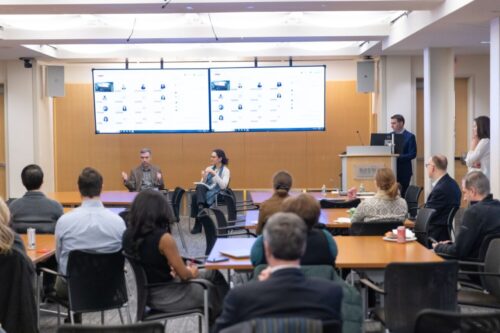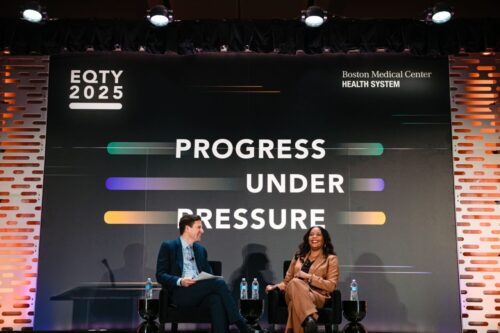Youth Advisory Board Elevates the Voices of Black and Indigenous Teens
September 6, 2022

Getty Images
"As we aim toward health equity, we need to remember all the voices that we need at the table… the voice of youth has almost always been blocked out."
Young people can bring new ideas and a fresh perspective to solving problems within their communities and society as a whole. In recent years, youth-led movements have been on the rise, tackling some of the country’s biggest issues, such as gun control, climate change, and racial injustice. And yet, the voices of youth are so often silenced or ignored when it comes to healthcare.
With an eye toward elevating the voices of young people, Katherine Gergen Barnett, MD, vice chair of primary care innovation and transformation at Boston Medical Center (BMC), and Astraea Augsberger, PhD, assistant professor at Boston University (BU) School of Social Work, collaborated to develop a youth advisory board for the department of Family Medicine at BMC.
The year-long pilot board launched in 2020 and included eight Black, Asian, Afro-Caribbean, and Latinx Bostonians between the ages of 16 and 25. Because the project started at the height of the COVID-19 pandemic, the group focused on the health inequities the pandemic highlighted.
At the end of the pilot, the youth advisory board presented their recommendations to key stakeholders at BMC, and the researchers published their results in the Journal of Community Psychology.
“The recommendations that we’re actively working on in family medicine are doing more work on anti-racist training and expanding our mental health services for youth,” Gergen Barnett tells HealthCity, “which our board identified as one of the greatest needs in healthcare.”
Using Photovoice to capture health inequities during COVID-19
One of the board’s main projects was to use Photovoice — a participatory visual ethnographic health assessment strategy that is well-established for community-driven initiatives — to explore the question: What does health or healthiness mean to you and your community?
In this particular project, each board member captured images that represented their health priorities and then, together, they went through a process of analyzing the major themes that arose from all of their photos and collectively decided how those themes could potentially drive changes in community health.
The board identified COVID-19 as “a revealing force that highlights systemic inequities, driving individuals and communities to both cultivate their resilience and take healthcare into their own hands in response to government and policy level failures.”
“In doing this project, we found that COVID-19 really shined a light on the resilience of communities of color.”
When it came to that conclusion, then 18-year-old board member Osasenaga Idahor captured a photo of many bottles of vitamins his mother had their family take every day in an effort to keep them healthy during the COVID-19 epidemic. Other board members shared similar examples of ways their families had been forced to take their health into their own hands during the pandemic.
“In doing this project, we found that COVID-19 really shined a light on the resilience of communities of color, and how our communities were taking health into their own hands,” says Idahor. “That was one of the main messages we wanted to show to providers — because there’s a gap between intentionality and actualization of a lot of hospital services, this is what’s happening. And it really emphasizes the resilience of the community.”
Moving beyond tokenism to true engagement
Gergen Barnett says that once they started working with the board, she was surprised by the large gap between the intention to include youth voices and the true commitment required to actually make it happen.
“The healthcare sector has not picked up the youth voice, despite the critical need to do so,” she says. “And there’s a gap between tokenism and true engagement. If you’re going to build a youth advisory board, then you need to have true partners on the other end who are willing to invest time and energy and funds. And you must be willing to fall on your face and be vulnerable and be wrong. It has been an incredibly humbling experience.”
Idahor echoes Gergen Barnett. He says his participation on the board made him understand how important this type of engagement could be for future generations and for other types of board work in Boston.
“The healthcare sector has not picked up the youth voice, despite the critical need to do so.”
“Understanding that this work was allowing young people of color from around Boston to finally have a voice directly to BMC was awesome,” he says. “There’s a lot of impact behind community learning, and tapping into the youth voice, which a lot of organizations want to do, but so many ultimately don’t commit to doing.”
Luckily, Ausberger says that this year-long trial board gave their team some great ideas on how to move beyond tokenism to create a true partnership.
“One huge theme that emerged for us was how ready are we as adults and organizations to really partner meaningfully with youth,” she says. “That was something that came out in this process, and the youth developed specific recommendations around that.”
Creating the next generation of youth health advisors
Although the first board members have all gone in separate directions, Gergen Barnett says her team will use their guidance to develop the next board, for which they are currently recruiting, and which will serve the larger BMC community, rather than just Family Medicine.
“We know that real change happens over time, and we look forward to learning more about how to build positive relationships with youth and power-sharing with youth,” says Augsberger.
Gergen Barnett and Augsberger are also looking to disseminate their learnings to a broader audience, both within BMC and to other hospitals and healthcare systems nationally.
“As we aim toward health equity, we need to remember all the different voices that we need at the table,” says Gergen Barnett. “And the voice of youth — especially marginalized youth — has almost always been blocked out. If we’re actually going to change healthcare and healthcare delivery, then we need to prioritize bringing these voices to the table.”


